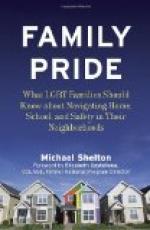St. John’s was crowded that night, just as churches always are on such occasions, the children occupying the front seats, with looks of expectancy upon their faces, as they studied the heavily laden tree, the boys wondering if that ball, or whistle, or wheelbarrow was for them, and the girls appropriating the tastefully dressed dolls, showing so conspicuously among the dark-green foliage. The Barlows were rather late, for upon Uncle Ephraim devolved the duty of seeing to the license, and as he had no seat in that house, his arrival was only known by Aunt Betsy’s elbowing her way to the front, and near to the Christmas tree which she had helped to dress, just as she had helped to trim the church. She did not believe in such “flummmeries” it is true, and she classed them with the “quirks,” but rather than “see the gals slave themselves to death,” she had this year lent a helping hand. Donning two shawls, a camlet cloak, a knit scarf for her head, and a hood to keep from catching cold, she had worked early and late, fashioning the most wonderfully shaped wreaths, tying up festoons, and even trying her hand at a triangle; but turning her back resolutely upon crosses, which were more than her Puritanism could endure. The cross was a “quirk,” with which she’d have nothing to do, though once, when Katy seemed more than usually bothered and wished somebody would hand her tacks. Aunt Betsy relented so far as to bring the hoop she was winding close to Katy, holding the little nails in her mouth, and giving them out as they were wanted; but with each one given out, conscientiously turning her head away, lest her eyes should fall upon what she conceived the symbol of the Romish Church. But when the whole was done, none were louder in their praises than the good Aunt Betsy, who was guilty of asking Mrs. Deacon Bannister when she came in to inspect, “why the orthodox couldn’t get up some such doin’s for their Sunday school. It pleased the children mightily.”
But Mrs. Deacon Bannister answered with some severity:
“We don’t believe in shows and plays, you know,” thus giving a double thrust, and showing that the opera had never been quite forgotten. “Here’s a pair of skates, though, and a smellin’ bottle. I’d like to have put on for John and Sylvia,” she added, handing her package to Aunt Betsy, who, while seeing the skates and smelling bottle suspended from a bough, was guilty of wondering if “the partaker wasn’t most as bad as the thief.”
This was in the afternoon and was all forgotten now, when with her Sunday clothes she never would have worn in that jam but for the great occasion, Aunt Betsy elbowed her way up the middle aisle, her face wearing a very important and knowing look, especially when Uncle Ephraim’s tall figure bent for a moment under the hemlock boughs, and then disappeared in the little vestry room where he held a private consultation with the rector. That she knew something her neighbors didn’t was evident. But she




